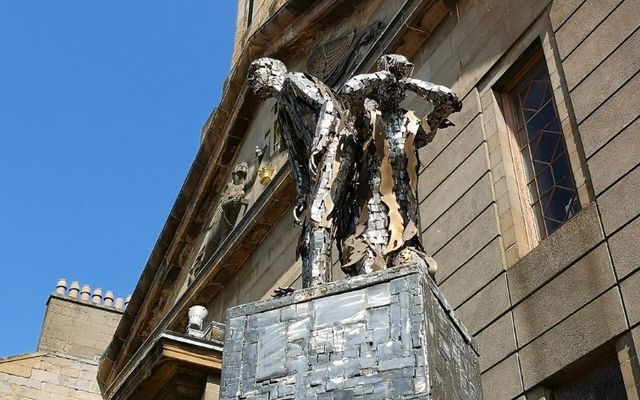A Catholic church in Glasgow has unveiled a memorial to the victims of the Irish Famine despite some criticism from local politicians.
St. Mary's Roman Catholic Church in Calton unveiled the "Tower of Silence" memorial in a ceremony on Sunday, July 25, paying tribute to the estimated one million people who perished between 1845 and 1852 during the Great Hunger.
The five-meter steel structure also honors the 100,000 Famine immigrants who emigrated to Glasgow and depicts emaciated figures who moved to Glasgow to start a new life.
St. Mary's Roman Catholic Church is the second oldest church in Glasgow and was the site of the first meeting of Celtic Football Club in 1888.
Local MP Alison Thewliss attended Sunday's unveiling ceremony and paid tribute to the Coiste Cuimhneachain An Gorta Mór, which organized the project.
"Congratulations and thanks to the dedicated An Gorta Mór Committee for their work to build this memorial to An Gorta Mór," Thewliss said on Twitter.
"A very moving ceremony to unveil The Tower of Silence in its home in St Mary's in the Calton this afternoon."
Congratulations and thanks to the decidated @GortaMorGla Committee for their work to build this memorial to An Gorta Mór.
A very moving ceremony to unveil The Tower of Silence in it's home in St Mary's in the Calton this afternoon. pic.twitter.com/TJiA8TlTVE
— Alison Thewliss ? (@alisonthewliss) July 25, 2021
However, the memorial has previously attracted criticism from local politicians, who claimed that the plans to build the Tower of Silence were provocative.
One West of Scotland MP recently told the Sunday Times that the plans to unveil the statue will heighten tensions in the area surrounding St. Mary's Church, which has seen a spike in violence between Catholic and Protestant communities in recent years.
"This project will do nothing other than foster division between communities in Glasgow and become a magnet for controversy. Its unveiling during the marching season in the West of Scotland will only heighten tension," the MP told the Sunday Times earlier in July.
Meanwhile, Scottish historian Sir Tom Devine described the plans to unveil the memorial as "brazen" and questioned the motives of the project.
He asked whether the memorial remembered all families who were devastated by the Irish Famine. Devine pointed to the installation of a Famine memorial in Glasgow Green in 2018, which remembered all victims of the tragedy "be they Catholic Irish, Protestant Irish or Protestant Gaels".
Jeanette Findlay, chairwoman of Coiste Cuimhneachain An Gorta Mór, defended plans for the memorial, stating that the project had been a "positive experience for the organization.
"Some would regard as controversial anything that commemorates the plight of the Irish but getting our community involved, raising money for the project has been a positive experience for us," Findlay told the Times.




Comments